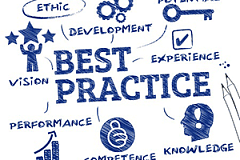 As employee demographics continue to transform the workforce, these business strategies will help your organization appeal to millennial employees and maximize their contribution to the company.
As employee demographics continue to transform the workforce, these business strategies will help your organization appeal to millennial employees and maximize their contribution to the company.
Millennials, the generation born between 1981 and 1996, have all hit the age of employment and are taking over the workforce. By 2018, 35 percent of employed Americans were millennials. Those numbers continue to grow, making them the most employed generation in the nation.
With their technological literacy and desire to excel at work, millennials are a huge asset to employers. [quotes]The problem? Over half of millennials expect to leave their jobs by the end of 2019 for new opportunities.[/quotes]
The reason? Millennial workers are always seeking new learning and advancement opportunities.
The solution? Employers need to implement business strategies that will keep millennials engaged at work. Let’s look at eight modern business strategies you can use today and why they're important.
1. Offer Flexibility
When your employees ask for flexible work hours, it's not because they're lazy or trying to work less. It's more likely that they're hoping to maximize their time and ensure that they can complete their daily work requirements in spite of other obligations.
The same study that concluded that millennials have a strong desire to excel at work also found that they are reluctant to take sick days. On top of that, over a third of millennials are working a second job to increase their income.
Allow your employees occasional work-from-home days or altered in-office hours. This will give them the opportunity to better their work-life balance. It will also ensure they're getting everything done to the best of their abilities.
Further, it will show them you trust that they can get their work done without being micromanaged and that you appreciate their dedication.
2. Provide Learning Opportunities
Whether they hope to advance within your company or elsewhere in the future, millennials appreciate opportunities to learn new skills. Providing learning opportunities will help them to feel like their job has more value to them than simply paying the bills.
Stay up to date on the newest technology in your field and give your employees the time and resources to learn how to use it. Bring in relevant keynote speakers to lead conferences.
Offer funding for continuing education courses for your employees. This will help them stay current and knowledgeable about the job.
[quotesright]Offering new learning opportunities signals to your employees that beyond wanting them to show up and complete tasks on time, you want them to succeed in life. [/quotesright]
3. Offer Leadership Coaching
Think of yourself and other higher-level managers as more than just "in charge" of your employees. Consider yourself a mentor.
On a day-to-day basis that entails leading by example. Share your knowledge and experience with them and make yourself available to them when they have questions.
You may also want to conduct seminars for those of your employees who want to become leaders, themselves. (And if you've hired motivated employees, that will probably be a great number of them.) Talk to them about what it takes to be a strong leader and what steps they can take early in their careers to put them on the right path.
As the saying goes, great leaders aren't born, they're made. [quotesright]Don't expect your employees to come in with the tools to advance. Give them those tools. [/quotesright]
4. Utilize Teamwork
In the twentieth century, many offices were fueled by competition. Coworkers strove to gain more clients and sell more products than one another in the hopes of getting a faster promotion or the end-of-year bonus.
Millennials, however, have grown up in a culture of teamwork. In grade school and college, collaboration has been a large focus of the curriculum. Most younger employees would prefer to work with one another, rather than in competition.
[quotes]It may require some serious change management on your end if your older employees aren't used to collaborative work.[/quotes] It's important that everyone is adaptable to new work styles.
Encourage collaboration on major projects by putting together teams and task forces. Create a work environment that is open and allows for conversation, rather than isolating your employees in cubicles or separate offices.
Teamwork will allow individual employee's strengths to shine through. It will also lead to better end results.
5. Diversify Job Requirements
Millennials enjoy new challenges that keep them motivated. It may be simpler to ask different employees to complete the same types of tasks day in and day out. However, diversifying the workload for your employees can keep them interested.
Giving your employees new challenges from time to time can also create a sense of mentorship among peers. Encourage less experienced employees to seek advice and guidance from others as they work through new tasks. That way, they can rely on more than a trial-and-error process, which may be frustrating for them and for you.
Allowing younger employees the hands-on experience of taking on new challenges is one of the best ways to prepare them for more advanced positions. They'll feel more confident when you offer them the opportunity to advance and you will have less training to do when the time comes.
6. Center Team Building Activities Around Giving Back to the Community
The occasional happy hour or miniature golf day is fine. However, millennials are more invested in doing something that makes a difference. Plan team-building activities that allow your employees to get to know each other while also doing something positive for the community.
There are a number of ways to do this! Host a fundraiser for a local charity or, if your employees are physically able, join a walk-a-thon with a good cause.
Alternatively, let them donate their time, rather than money spending a workday volunteering at a non-profit. For example, work at an animal shelter with their rescue animals, give out food at a food bank, or clean up litter at a park or nature preserve. Engage your employees in picking an organization to volunteer with and spread some positivity around your community! (Don’t forget, millennials like to collaborate, so have a few get together to contact and line up organizations, it’s a win-win-win.)
7. Get Serious About Ethics
All companies should take their ethics training and accountability seriously, regardless of who they employ. However, ethics in the workplace need to be taken more seriously now than ever. Not only are more companies hiring a more diverse range of employees, but younger generations tend to be more aware of and vocal about the wrongs of discrimination.
Make ethics training a requirement for every employee and hold seminars on the importance of respect and acceptance. That being said, you need to pay more than just lip service to ethical practices.
Take seriously all reports of discrimination in the office. [quotesright]Employ zero-tolerance policies for race, sexuality, and gender-based discrimination. Put an end to any "humor" that makes minorities the butt of the joke. [/quotesright]
Ultimately, your employees need to feel safe, comfortable, and accepted at work. There is absolutely no excuse for inappropriate behavior at work. Tolerating discrimination through inaction signals to your employees that you respect certain demographics more than others, and the millennials in the office are likely to start looking for more tolerant places to work as a result.
8. Don't Waste Time and Money on the Wrong Perks
While it's true that many millennials value a positive and possibly even fun work environment and culture, there seems to be a myth surrounding the perks they look for in a job.
For example, everyone loves free food, but you don't need to start a company-sponsored Taco Tuesday to keep your millennials happy. Nor do you need to purchase games for the office like ping pong tables and giant Jenga sets.
[quotes]Perks you should focus on are better healthcare programs, paid time off for sick days, and equal maternity and paternity leave.[/quotes] These are genuinely valuable assets that can make a long-term difference in the health and happiness of your employees. Time-wasting tactics are not.
Get Serious About Your Business Strategies
If you truly want to appeal to a millennial workforce, implement serious and long-lasting business strategies, not quick fixes and fleeting improvements. Ditch the myth that millennials are lazy or want to goof off and embrace the realization that they want more out of their work.
While you may not have the resources to implement every one of the strategies we've discussed, pick the ones that make the most sense for your business.
If you know there is room for advancement within your company, open these opportunities to millennials by giving them the proper tools. If you know there are ways for the company to improve, implement those changes and create learning opportunities for everyone in the office.
Have any questions about business and can't find the answers on our site? Shoot me an email or call. We're happy to help you ditch the pesky things that slow you down or sap profitability so you grow your sales and your bottom line! Brian Tracy USA: 877.433.6225 Email Me feedback@focalpointcoaching.com














